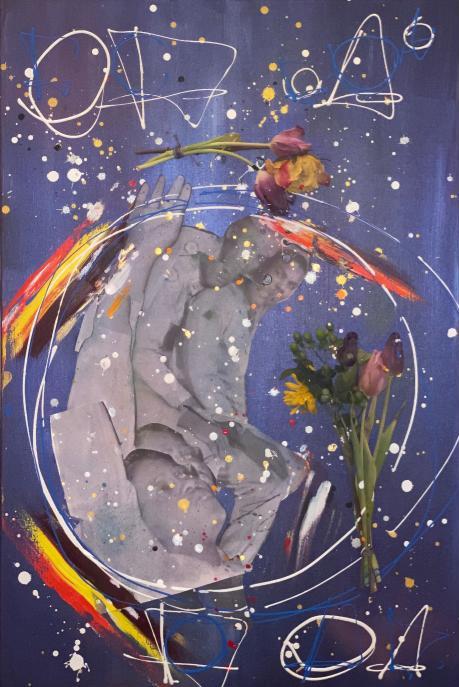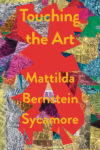
This piece was originally published in Full Stop Reviews Supplement: Summer 2021. Subscribe at our Patreon page to get access to this and future issues. Your support makes it possible for us to publish work like this.
1) Black religion — in our moment, post-Trump, in the now new post-Reagan neoliberal moment, in any moment or age, really — needs friendship as practice. And black religion in this complex and dense and long momentary rupture producing the temporality of western theological and philosophical thought needs blackqueerness. Blackqueerness is fundamental to but also excluded from the institutional practice of black religion because it unsettles identity fully, because it is open and capacious and enduring. This, its being open and capacious and enduring is its gift, not as identity but as relation. It’s felt and sensed and known in the music, in the sound, in the performance of being together.
2) When black religion functions in the service of, rather than against, empire, dominance, and violence, it loses its life and breath, it ceases to be the practice of radicalism, it relinquishes friendship. Doctrines and theologies are antagonistic to friendship because they must be adhered to, must be aspired towards, for their articulation. Doctrines and theologies make themselves available for empire, dominance, violence, because they are the practice of making thought and breath and performance normative.
3) In Michel Foucault’s interview “Friendship as a way of life,” he discusses the ways that, in friendship, those committed to the practice of friendship must invent “from a to z,” he says, how to be with another, which at its initial moments is formless. We must practice invention and innovation, we must be inventional, to respond to the urgency of any now moment, to practice friendship. Black religion in the current crisis of political and economic upheaval — post-Trump, during COVID, in the long moment of racial capitalism and its now inflection through neoliberal forces — must rediscover friendship.
4) The interpersonal is how I come to understand the problem of religiosity, as a person attempting to practice blackqueer life and relation, having been excluded from the religious communities that have formed me because of doctrinal and theological breaks between those communities and my practice. There are questions that would be necessary for reestablishing relation, for rediscovering friendship: how are you; can you help me understand; is there a way for us to practice relation in our difference? But these questions cannot be asked under the regime of identity because it is a thing that assumes a stable core coherence, an unchanging essence. But what black religion is, is a freedom impulse, a liberatory drive and verve, it is not identity but practice. We must learn how to practice relation, we must learn to refuse to relinquish one another for something like doctrinal integrity of traditions of churches, mosques, masculinities.
5) I have been writing about white supremacy as the renunciation of the flesh, how white supremacy is the practice of renunciation of relation, of the social, of blackness. And I have been teaching Alice Walker’s The Color Purple and have been thinking a lot about the character Harpo. He loved to cook, to clean, to take care of the children. But because he wanted to be a “real man,” because he wanted to participate in patriarchal dominance, he was willing to relinquish his joy, his absolute delight and happiness, he let go friendship, in order to compel his wife Sofia to mind him, and he was willing to do this with brutal violence.
Harpo gave up his joy to attempt the normative. And I think about the black church’s relinquishing of blackqueer folks, their release of joy and delight found in blackqueer praise and practice, in order to attempt normative doctrine and theology of sex, sexuality, and sin. It is heartbreaking. The desire for normative function and form — whether the guise of patriarchy as a system of domination, religious chauvinism, normative gender and sexuality as a mode of queer antagonism, settler colonialism, antiblack racism — dispenses with difference, renounces possibility for and of and about relation.
The Color Purple shows that men have the ability to do emotional, intimate, and aesthetic labor. It brings Harpo lots of joy to do it, it brings Harpo lots of misery to live a normative life. Walker elaborates the ways the systems of domination called patriarchy, heterosexism, and queer antagonism produce occasions for men to practice renunciation of the social field in which this kind of labor is produced.
So when Harpo relinquishes the care work he enjoyed in order to be a “real man,” to enact patriarchal power, he also practiced the refused relation to his own capacity for intimacy and friendship with Sofia that the work made possible, it is the renunciation of labor and of the sociality that is had and gained and practiced through that labor. He gives up, and relinquishes, the capacity for being in relation in a way that is deeply emotional, intimate and physical. He gives up friendship as a way of life, forestalling it. He gives up intimacy as a way of lovingness and livingness, refusing its capacity for radically altering who they could be.
Harpo might be the practice of black religiosity in our current age when religious practice acquiesces to empire, to patriarchy.
6) We must rethink tradition; how do our particular practices of Christianity or Islam or Buddhism or agnosticism open us up to relation. This question of the possibility for being moved is informed by my reading of Imani Perry’s Vexy Thing: that we must contend for relation with one another, that we must be open to being moved by one another. And I am informed, too, by Fred Moten’s In the Break, in which he talks about the dispossessive force objects exert on subjects that would objectify them, that would abuse them, such that, he says, subjects are infused and deformed by the object they hold. Both Perry and Moten let me think about how relation is the practice of being infused and informed and deformed and reformed. And they let me consider the various ways we refuse this being infused and informed and deformed and reformed in the service of a political economy of extractive violence and exploitative practice.
This openness to being moved is what black religiosity as practice teaches. This capacity for being moved, undone, vulnerable, is relinquished in the concept of identity grounded in a past of resistance that then presumes any current political position is itself radical. But radicalism, like blackqueerness, is practice. Relation with people that practice blackqueerness is blackqueer because it is a mode of relation against patriarchy. Relation with people that practice radicalism is radical because it is a mode of relation against normative function and form, a practice of insurgency against violence and violation.
7) There is a film, Purple Rain starring the musician genius Prince. And there is a film based on Purple Rain located in Nigeria spoken in the Tuareg language titled, Akounak Tedalat Taha Tazoughai, which is a Tuareg phrase that translates to Rain the Color of Blue With a Little Red In It. They utilize the transliteration color of blue with a little red in it because in Tuareg, there is no word for the color purple.
I think the difference between “Purple Rain” and “Rain the Color of Blue With a Little Red In It,” is beautiful. Beautiful because it illustrates the way we have to search language for feeling, for familiarity, for that which can be lost if we think “there is no word for purple in that language.” Walker’s novel is about the beauty of the ordinary, the joy of breath, and being found in the everyday. Don’t walk by the color purple and not glory in its splendor, the novel intimates, because it would piss off the gods. Because it is miraculous, this color, all colors. But not just color: fragrance and taste and the texture of hands that delicately pick cotton or caress a lover’s face or the sound of life happening with bees and beauty and trees. The Tuareg language perhaps does not have the color purple in its lexicon but it does have a way to name the sense perception for noticing that color: the blue with a little red in it.
And though there is no word for purple in Tuareg, that does not mean the color is not real, doesn’t mean the sense experience of it doesn’t happen, or that the object doesn’t produce the color blue with a little red in it. We can find delight and joy in the gap between, the space where difference is practiced and felt and known. This delight in difference is what black religion in the post-Trump still-neoliberal age, which is another way to say black religion in the age of Thomas Jefferson, which is another way to say black religion in the age of racial capitalism, antiblack racism, and settler colonialism, needs to rediscover. In such a rediscovery will be the reckoning with the urgency of our times. And, perhaps too, the possibility for the practice of friendship and sensing the sound of color and texture of light.
Ashon Crawley is an artist, writer and teacher based in Charlottesville, Virginia. He is associate professor of Religious Studies and African-American and African Studies at the University of Virginia, and the author of The Lonely Letters (2020) and Blackpentecostal Breath: The Aesthetics of Possibility (2016). He is currently at work on two books, an oral history project and an audiovisual art experience about the Hammond B3 organ, the Black church and sexuality. His artwork is at the intersection of performance, painting and sound making. All his work is about otherwise possibility.
This post may contain affiliate links.







